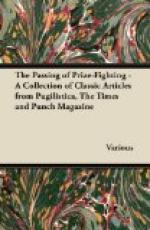The play opens with an elderly gentleman, in a spangled dressing-gown, who commences business by telling us the time of day, poetically clapping a wig upon the sun, by saying, he
“Shakes day about, like perfume from his hair,”
which statement bears out the after sentence, that “the wisdom he endures is terrible!” An Austrian gentleman—whose dress made us at first mistake him for Richard III. on his travels—arrives to inform the gentleman en deshabille—no other than Cardinal Martinuzzi himself—that he has come from King Ferdinand, to ask if he will be so good as to give up some regency; which the Cardinal, however, respectfully declines doing. A gentleman from Warsaw is next announced, and Castaldo retires, having incidentally declared a passion for the reigning queen of Hungary.
Mr. Selby, as Rupert from Warsaw, then appears, in a dress most correctly copied from the costume of the knave of clubs. Being a Pole, he stirs up the Cardinal vigorously enough to provoke some exceedingly intemperate language, chiefly by bringing to his memory a case of child-stealing, to which Martinuzzi was, before he had quite sown his wild oats, particeps criminis. This case having got into the papers (which Rupert had preserved), the Cardinal wants to obtain them, but offers a price not long enough for the Pole, who, declaring that Martinuzzi carries it “too high” to be trusted with them, vanishes. Mr. Morley afterwards comes forward to sing a song according to Act of Parliament, and the scene changes for Miss Collect to comply, a second time, with the 25th of George II.
In the following scene, the Queen Dowager of Hungary, Isabella, introduces herself to the audience, to inform them that the Austrian gentleman, Castaldo, is
“the
mild,
Pity-fraught object of her fondness.”
He appears. She makes several inflammatory speeches, which he seems determined not to understand, for he is in love with the virgin queen; and maidens before dowagers is evidently his sensible motto.
The second act opens with the queen junior stating her assurance, that if she lives much longer she will die, and that when she is quite dead, she will hate Martinuzzi[3]. As, however, she means to hate when she is deceased, she will make the most of her time while alive, by devoting herself to courtship and Castaldo: for a very tender love-scene ensues, at the end of which the lady elopes, to leave the lover a clear stage for some half-dozen minutes’ ecstatics, appropriately ended by his arrest, ordered by Martinuzzi. Why, it is not stated, the officer not even producing the copy of a writ.
[3] “Czerina.
When I am dead—which will be soon—I
feel,
If
I much longer on my throne remain,
I
shall abhor the name of Martinuzzi.”




